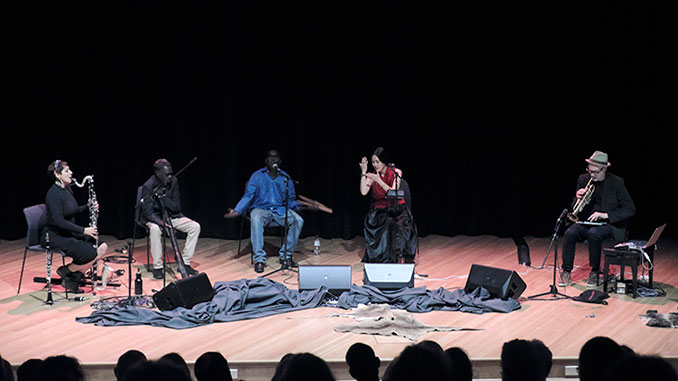Presented in two separate parts this concert provided not only a rare and extraordinary glimpse into the music-making of our first nations people, but also provided a tantalising glimpse at how it could eventually become absorbed in the music mainstream.
Following a short welcome speech by Festival Director, Roland Peelman, The first section, Yugal Mudhaybaraay (Possum Song) began.

Eight Yuwaalaraay women took the stage, carrying possum rugs they had made previously. Kneeling across the stage, they folded the rugs across their laps.
Their leader, Nardi Simpson, established a steady rhythm by firmly slapping her rug. The other women followed and began their song, which was sung to the accompaniment of a flute played by Lamorna Nightingale, recorded bird sounds and drone.
Sung in language and without artifice, their melody was simple and catchy with only occasional changes in rhythm and tempi.
Despite the formal setting of the Fairfax Theatre, it was easy to imagine the ancestors of these women sitting under trees, exactly like this, enjoying each other’s company and their communal music-making.
At the end of their song, as the women stood up to take their bow, they turned the possum rugs to reveal artworks painted on the backs.
The second work on the program Hand to Earth was developed during an Australian Art Orchestra residency in the remote highlands of Tasmania, during which Yolgnu songman, Daniel Wilfred, developed a rapport with Korean singer Sunny Kim.
Orchestra member, Peter Knight created a series of electronic atmospherics to meld their varying vocal approaches, and later, multi-instrumentalist, Aviva Endean and Daniels’ brother, David, were added to the project creating an intriguing musical experience.
Singing in language in a strikingly clear natural sound, Daniel Wilfred commenced a long traditional song immediately evoking timelessness at one with David Wilfred’s haunting didgeridoo.
Working with a small lap-top computer by his side, trumpeter Peter Knight provided electronic ornamentations, augmented with variations played on a variety of instruments by Aviva Endean, while Sunny Kim intoned improvised vocalisations.
The resultant sound was initially intriguing, rarely atmospheric, and occasionally, pure cacophony. Sunny Kim also contributed a Korean children’s song, revealing a lovely warm contralto voice, but it seemed a puzzling addition rather than complimentary to the original work.
Although this listener would have preferred to have experienced the Wilfred brothers au naturel, what are music festivals for if not for experimentation? This extraordinary ensemble certainly delivered a compelling demonstration of musical possibilities.
This article was written by Bill Stephens OAM from Australian Arts Review.